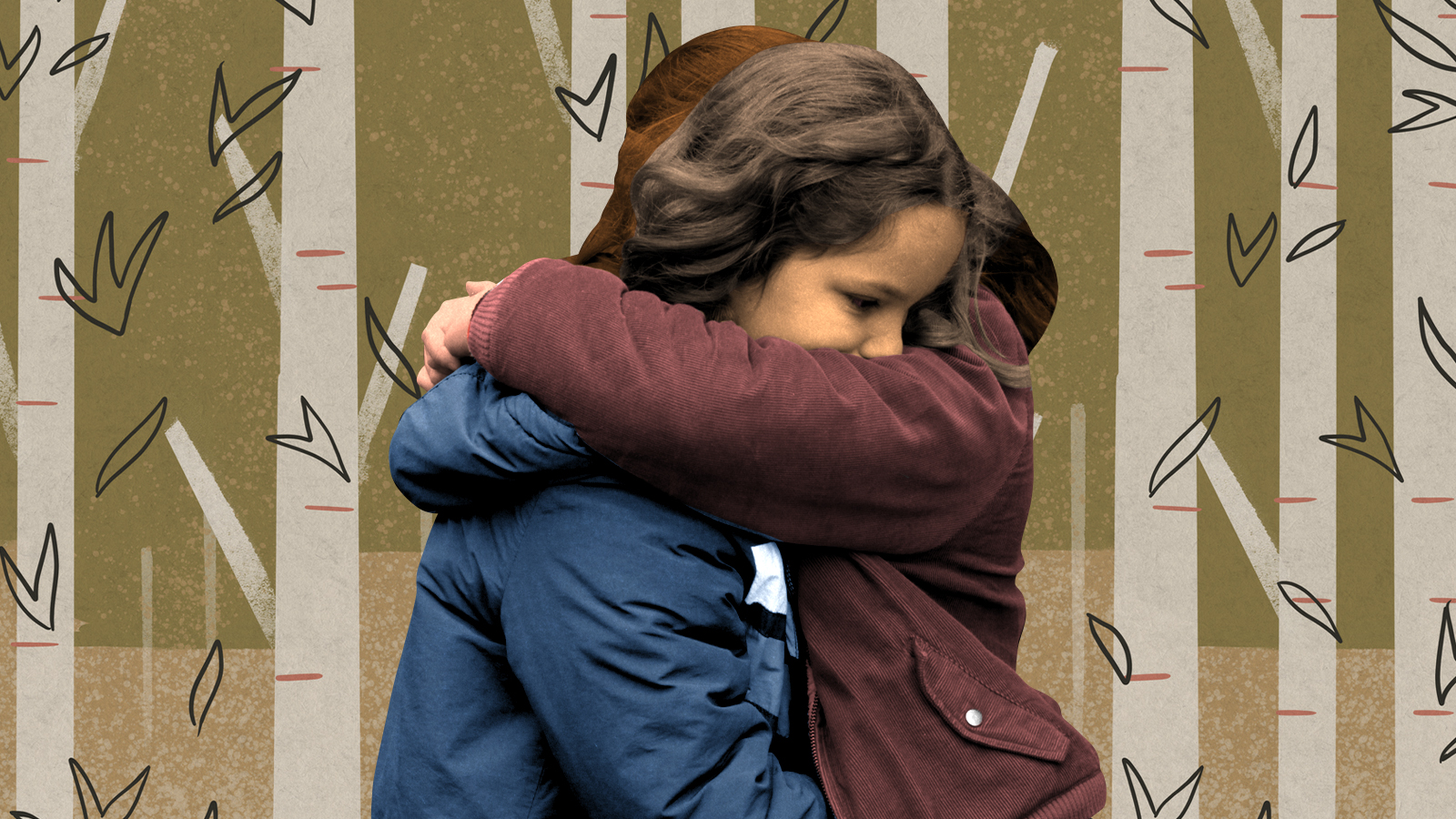Petite Maman makes the arthouse film accessible to everyone


A free daily email with the biggest news stories of the day – and the best features from TheWeek.com
You are now subscribed
Your newsletter sign-up was successful
If watching this year's Academy Awards ceremony felt like lying awake on a surgical table, then watching commentary on the ceremony felt an awful lot like waking up in a bathtub with nephrectomy stitches. Jimmy Kimmel lamented that not a single one of the Best Picture nominees was Spider-Man: No Way Home; Trevor Noah equated watching those very same nominees with the practice of healthy eating; and Saturday Night Live aired the admittedly amusing music video "Short-Ass Movies," where Pete Davidson, Chris Redd, Gunna, and Simon Rex rap the praises of films that clock in at 100 minutes or less, with John Cherry's work given especially high marks.
Grant that the SNL skit didn't target the Oscars specifically; forget that this year's Best Picture category featured a satire for the "fake news" era of dimwitted American politics (Don't Look Up), a mega-budget sci-fi space opera (Dune), a slick, macabre neo-noir (Nightmare Alley), a hagiographical biopic (King Richard), a 1970s-set coming of age comedy (Licorice Pizza), a crowd pleasing tear jerker (CODA), and a new adaptation of one of the all-time great stage musicals from one of the all-time great filmmakers (West Side Story), among others. Kvetching (partly in jest) about running times, and about arthouse cinema (not at all in jest) either as homework or a necessary but pleasureless prerequisite for salubrity, is sending a clear message: Movies that focus on weighty subjects (performative and sadistic machismo, processing grief), that stretch out over 2 hours or more, and that are produced and take place in other countries and so call for subtitles, are a drag.
This style of anti-intellectual populism is troubling at best and aggravating at worst for enough reasons to fill a book; it is also aimed at Jane Campion's The Power of the Dog by Kimmel specifically, and at Ryuske Hamaguchi's Drive My Car by him and Noah indirectly. Fortunately, into this tiresome discourse at the right time comes a film well-suited for resolving it: Petite Maman, the latest film by contemporary French master Céline Sciamma.
The Week
Escape your echo chamber. Get the facts behind the news, plus analysis from multiple perspectives.

Sign up for The Week's Free Newsletters
From our morning news briefing to a weekly Good News Newsletter, get the best of The Week delivered directly to your inbox.
From our morning news briefing to a weekly Good News Newsletter, get the best of The Week delivered directly to your inbox.
Pardon the glaring disconnect. At a glance, a movie like Petite Maman is anathema in conversations over the movies that institutions like the Academy of Motion Picture Arts and Sciences instruct American audiences to watch: It is foreign, and worse than that, it is French, a background that in any context, but in cinema's context especially, signals a guarantee of inscrutable snootiness. If you're making this assumption, rest assured: You are wrong. Petite Maman is as accessible as foreign arthouse movies get, and to sweeten the pot, it's a scant 70 minutes in length. The opportunity cost is low. The return on your time investment is stratospheric.
Petite Maman is the story of Nelly (Joséphine Sanz), going through a tragedy familiar to many an 8-year-old: She has just bid adieu to her beloved grandmother for the last time. The movie opens as Nelly and her mom (Nina Meurisse) clear out grand-mère's room at the nursing facility before trekking to mom's childhood home to do the same. This is not a child's idea of a good time, so Nelly whiles away the hours playing in the woods, where she meets another 8-year-old, Marion (Gabrielle Sanz). It's little surprise that they hit it off immediately. It's more surprising that Marion and Nelly look shockingly alike, and that Marion's house looks exactly like grand-mère's house, and that Marion's own mom looks exactly like Nelly's grand-mère in her 50s; by the strangest coincidence, "Marion" is Nelly's mother's name, too, and "Nelly" is young Marion's own grand-mère's name.
Nelly does the math, and because she's a child, concludes and accepts that by the mechanics of metaphysics, she has traveled back in time and met her mother as a kid and her grand-mère as an adult. Pause to breathe. It's a lot. Knotty as Petite Maman's plot sounds on paper, though, Sciamma presents it clear as crystal on screen. There's a reason she's considered one of the great modern directors: She's really, really good at what she does, and what she does with Petite Maman is ride a stripped-down aesthetic to a finely balanced result.
Movies don't need to satisfy every moviegoer, of course, and frankly they can't. Taste is taste. We all know what we like. But the paradox of taste is that we don't know what we like until we try it. Petite Maman is a quiet film about profound and universal human sensations; it sounds esoteric, but it's so unfussed and its experiences apply to so many people that the only qualifications anyone needs to understand it is to have lived a few years on Earth. Sciamma works on a child's level; the world of Petite Maman is seen through Nelly's eyes alone. It's her movie. Sciamma sculpts the emotional components Noah dryly mocks in his Daily Show segment down to their most straightforward state. To Nelly, everything we adults see as complicated is obvious. This doesn't mean Petite Maman is an obvious movie, but a movie that eschews secrecy by the very nature of its perspective.
A free daily email with the biggest news stories of the day – and the best features from TheWeek.com
Put another way, Petite Maman has a severe allergy to malarky, and so there is no malarky to be found in its 1 hour 10-minute duration. Adults hide themselves. Kids are open books. Sophisticated kids pull your card when you hedge on your feelings, as Nelly does with her mom in an early bedtime scene. "Does it upset you, being here?" Nelly asks her mom. "I liked this room," mom replies. "I didn't like it at night." When Nelly presses for more details, mom deflects: "Child's stuff." "I'm interested," Nelly retorts. "I'm a child." And when mom chides her for asking questions only at night, Nelly points out that night is the only time she gets to see her. Nelly doesn't tolerate either mom or dad's (Stéphane Varupenne) brush-off attempts; she wants to know, in her words, "the real stuff."
Sciamma's basic conceit, a blend of soft sci-fi and fantasy, gives her what she wants. We'd all like to know who our parents were before we arrived in their lives like squalling wrecking balls. Petite Maman imagines ultimate access for answering burning questions about the past: Where our mothers and fathers came from, and where our grand-mères and grand-pères came from, and by extension where we came from, too. Nelly is tickled to learn that Marion wants to be an actress when she grows up; that they share the same likes; that she loves Nelly's grand-mère as much as Nelly loves her; that she's lonely like Nelly is lonely, and she needs companionship and reassurances that loneliness is merely a moment in time.
But Petite Maman matches melancholy with the pure delight only children know. Before Nelly and Marion part ways, they have a sleepover; in the morning they make pancakes. When 8-year-olds make pancakes, really what they make is a mess. If two girls in a giggle storm spilling batter on the kitchen table, giving each other pancake mustaches, isn't the definition of "joy," nothing is; if two girls boating to a concrete pyramid bobbing on a lake in Cergy-Pontoise (the Parisian suburb where Sciamma was raised) doesn't capture childhood's guileless beauty singlehandedly, nothing can.
Sciamma, however, makes two significant calculations for filtering both sensations into Petite Maman. The first is casting the Sanz twins. The second is reteaming with cinematographer Claire Mathon, who shot Portrait of a Lady on Fire, Sciamma's last movie. Portrait of a Lady on Fire contains flourishes that are more daring and inventive than what we see in Petite Maman, but Petite Maman needs neither daring nor invention. It needs simplicity. Sciamma figures out where Mathon's camera needs to go; Mathon sets up her camera and shoots. There's nothing tricky about the work, just an exercise in the fundamentals of filmmaking pulled off so well that the simplicity becomes deceptive: Anyone could do this. Except Sciamma isn't anyone. She's a veteran artist at the top of her profession.
All this matters, but for hesitant audiences it doesn't matter half as much as taking a crucial first step: Getting into the theater. (Assuming you are comfortable going to the theater. If not: Neon, the film's distributor, has a licensing agreement with Hulu, so all of their productions, including Petite Maman, arrive on the streamer in due time.) The next step is opening up to hear what Petite Maman tells audiences about saying goodbye and growing up. Maybe you like arthouse cinema. Maybe you like Marvel movies. Either way you've grown up and you've said "goodbye" to people that you love. In Petite Maman, we find impetus to reconsider those moments in our lives afresh. Don't let the Kimmels and the Noahs steer you away from an opportunity this rich.
Bostonian culture journalist Andy Crump covers the movies, beer, music, and being a dad for way too many outlets, perhaps even yours: Paste Magazine, The Playlist, Mic, The Week, Hop Culture, and Inverse, plus others. You can follow him on Twitter and find his collected writing at his personal blog. He is composed of roughly 65 percent craft beer.
